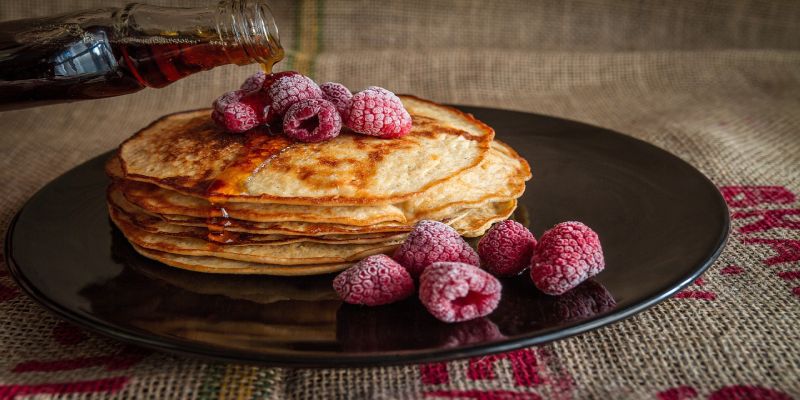Believe it or not but pancakes have been around for centuries and are a staple in several cultures. According to a study, pancakes were enjoyed by people as far back as 30,000 years ago. Some believe the first recorded mention of pancakes was made in 600 B.C. in ancient Greece.
In Rome and ancient Greece, pancakes were made with wheat flour, honey, olive oil, and curdled milk and it was during the English renaissance that people started flavoring their pancakes with spices, sherry, apples, and rosewater.
Each culture has its own version of the pancake. In France for instance, a pancake is called a crepe whereas in Scotland their version of the pancake is called a flapjack.
The term pancake was introduced in the 15th century and became a standard term for this dish in America in the 19th century. Earlier, pancakes were referred to as Indian cakes, johnnycakes, journey cakes, griddle cakes, flapjacks, and buckwheat cakes as early Americans make this delicious treat with buckwheat or cornmeal.
Let us take a look at the history of pancakes below
- 600 BC
The first ever recorded mention of pancakes was made in ancient Greece by a poet who described warm pancakes in his writings.
- 1100 AD
Pancake day was introduced. It encouraged people to use dairy in pancakes to make them fluffier and more enjoyable.
- 1445
This is the year that the villagers in Olney, United Kingdom, started their pancake race.
- 1700s
This was the year chefs used snow in the pancakes to make them light and fluffy.
- 1800
Milk and cream become preferred liquids in pancake batters before that wine, brandy and other liquors were quite common
- 1870
Flapjacks now pancakes changed the way Americans consumed them.
- 1880
Maple syrup is introduced and becomes the preferred topping
Pancakes are still evolving in terms of ingredients and toppings. Today, you can find fluffier pancakes, customized to taste.
How to make pancakes at home?
To make fluffy and delicious pancakes at home, you need to do the following
- In a bowl, put in flour, baking powder, sugar, and salt. If you do not have dry ingredients available at home, it is best to stack up on pre-mixed ingredients to save some time while cooking. You can find pre-measured mixtures from yogurshop on their website www.yogurshop.com
- Now, whisk the dry ingredients together then add a warm cup of milk, melted butter, vanilla extract, and an egg. Now slowly mix the ingredients till you have a nice, smooth batter.
- In a hot pan, add a ladle of batter till one side turns brown then flip and cook the other side.
- Garnish your warm pancakes with cake decorations and toppings like syrup, ice cream, whipped cream, or fruit, and voila, your pancake is ready.
How people around the world like to have their pancakes
Each country has its own take on the pancake. In Australia, for instance, you find pancakes the desired dessert option rather than a breakfast option. In Germany, you will find pancakes served along with soup or custard. The Swedes like frying their pancakes and topping them off with fresh fruit and whipped cream and in America, there are unlimited ways to consume them.
Some like them extra thick, and some like them thin. You can top them with maple syrup, honey, or simply butter. Honestly, there is no set way of enjoying a pancake, the best thing about this treat is that you can have it the way you like it.
Conclusion
In a nutshell, it is safe to say that the history of pancakes spans back centuries. It is an easy treat to make and requires 4 to 8 ingredients, depending on how you wish to make it. But with flour, baking powder, eggs, and buttermilk, you can whip up the fluffiest and most delicious pancakes ever. If you do not have these items laying around at home, we reckon you stock up on a pre-made or ready-made mixture from Yogurshop if you want authentic and rich flavors and the fluffiest consistency.
You also have the option of topping it with chocolate syrup, fresh fruits, maple syrup, ice cream, and custard, or simply have it with soup. The recipes are ever-evolving and there is no set way of having pancakes. That is the specialty of this treat – you can have it as a dessert or as a savory treat – and whatever you choose, you can’t go wrong with it.

